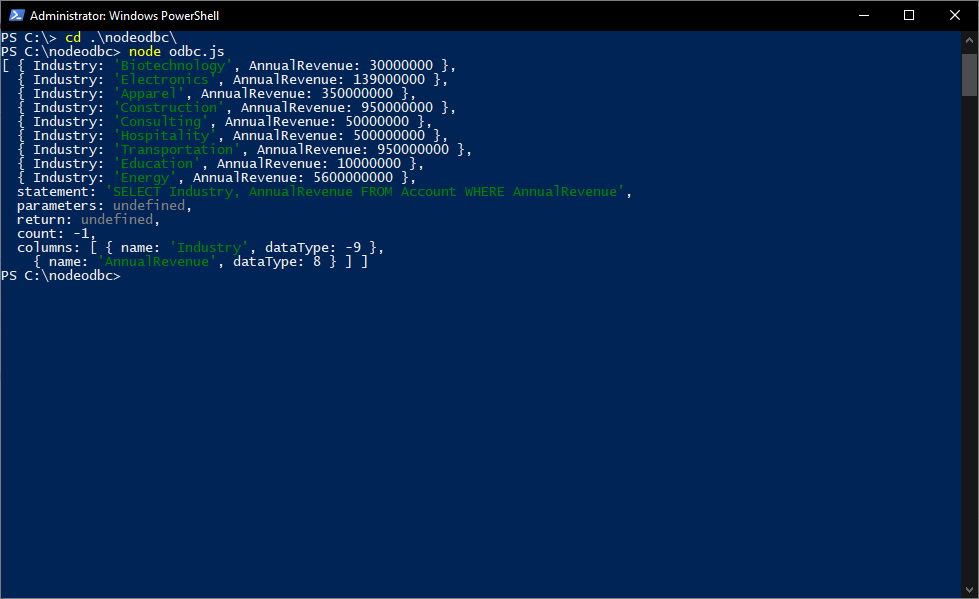Discover how a bimodal integration strategy can address the major data management challenges facing your organization today.
Get the Report →Query FHIR Data through ODBC in Node.js
Use node-odbc to execute SQL queries against FHIR data from Node.js.
Node.js is a JavaScript runtime environment that allows you to run JavaScript code outside of a browser. With the CData ODBC Driver for FHIR, you can access live FHIR data from Node.js apps and scripts. In this article, we walk through installing node-odbc and the required tools to create a simple Node.js app with access to live FHIR data.
With built-in optimized data processing, the CData ODBC Driver offers unmatched performance for interacting with live FHIR data in Node.js. When you issue complex SQL queries from Node.js to FHIR, the driver pushes supported SQL operations, like filters and aggregations, directly to FHIR and utilizes the embedded SQL engine to process unsupported operations client-side (often SQL functions and JOIN operations).
Connecting to FHIR Data
If you have not already done so, provide values for the required connection properties in the data source name (DSN). You can use the built-in Microsoft ODBC Data Source Administrator to configure the DSN. This is also the last step of the driver installation. See the "Getting Started" chapter in the help documentation for a guide to using the Microsoft ODBC Data Source Administrator to create and configure a DSN.
Set URL to the Service Base URL of the FHIR server. This is the address where the resources are defined in the FHIR server you would like to connect to. Set ConnectionType to a supported connection type. Set ContentType to the format of your documents. Set AuthScheme based on the authentication requirements for your FHIR server.
Generic, Azure-based, AWS-based, and Google-based FHIR server implementations are supported.
Sample Service Base URLs
- Generic: http://my_fhir_server/r4b/
- Azure: https://MY_AZURE_FHIR.azurehealthcareapis.com/
- AWS: https://healthlake.REGION.amazonaws.com/datastore/DATASTORE_ID/r4/
- Google: https://healthcare.googleapis.com/v1/projects/PROJECT_ID/locations/LOCATION/datasets/DATASET_ID/fhirStores/FHIR_STORE_ID/fhir/
Generic FHIR Instances
The product supports connections to custom instances of FHIR. Authentication to custom FHIR servers is handled via OAuth (read more about OAuth in the Help documentation. Before you can connect to custom FHIR instances, you must set ConnectionType to Generic.
Building node-odbc
In order to connect to FHIR through the CData ODBC Driver, you need to build node-odbc manually (after installing the required tools).
Installing the Required Tools
The following commands install the tools required to build node-odbc (note the -g parameter, which installs the tools globally).
npm i -g windows-build-tools npm i -g node-gyp
Building node-odbc
After installing the required tools, create a directory for the Node.js app and install odbc (which builds the binary for us to use in our Node.js script).
mkdir nodeodbc cd nodeodbc npm i -g node
Querying FHIR from Node.js
With the ODBC Driver installed, a DSN Configured, and node-odbc built, we are ready to query live FHIR data from a Node.js app. The sample code below connects to a specific DSN and queries the Patient table.
myscript.js
const odbc = require('odbc');
async function queryFHIR() {
const connection = await odbc.connect(`DSN=CData FHIR Source`);
const data = await connection.query('SELECT Id, [name-use] FROM Patient');
console.log(data);
}
queryFHIR();
Once you write the app, use node to execute the script:
node myscript.js

Download a free, 30-day trial of the CData ODBC Driver for FHIR and start working with your live FHIR data in Node.js. Reach out to our Support Team if you have any questions.






